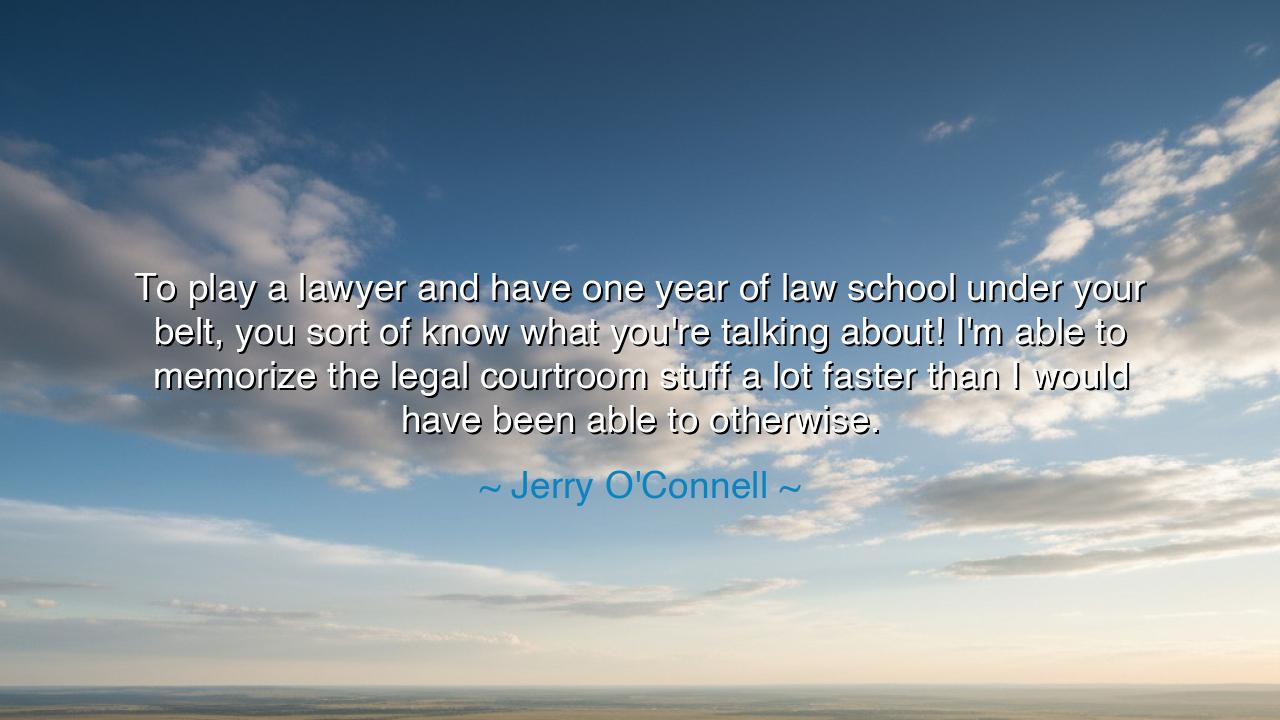
To play a lawyer and have one year of law school under your belt
To play a lawyer and have one year of law school under your belt, you sort of know what you're talking about! I'm able to memorize the legal courtroom stuff a lot faster than I would have been able to otherwise.






When Jerry O’Connell said, “To play a lawyer and have one year of law school under your belt, you sort of know what you’re talking about! I’m able to memorize the legal courtroom stuff a lot faster than I would have been able to otherwise,” his words carried more wisdom than they first appear to hold. On the surface, it is the statement of an actor delighted by how life’s experiences enrich his craft. Yet beneath that lighthearted tone lies a profound truth — that knowledge, once gained, never dies, and that every pursuit, no matter how brief or unfinished, leaves within us a seed that can bear fruit in unexpected seasons. His words celebrate not just education, but the interweaving of experience and expression, the meeting of intellect and art.
The origin of this quote lies in O’Connell’s own life — a journey that straddled both law and performance. Before fame and film, he had walked the halls of law school, learning the language of justice and the structure of argument. Though he did not complete his legal studies, that early training remained in him like an ember. When later he found himself portraying a lawyer before the camera, those dormant lessons reignited, lending authenticity to his performance. Thus, his words are not merely about memorization; they speak to the enduring power of education as transformation — the idea that every honest effort, even one abandoned midway, shapes who we are and what we can become.
This theme is as old as civilization itself. In the ancient academies of Greece, philosophers trained not only in reason but in rhetoric, music, and athletics — believing that wisdom in one domain strengthens understanding in another. Aristotle taught that “education is the best provision for old age,” meaning that learning prepares us not just for what we expect, but for what we cannot foresee. So too with O’Connell: his legal training, though seemingly unrelated to acting, later became the foundation upon which his art could flourish. This reveals an eternal truth — no knowledge is wasted, for the universe has a mysterious way of returning lessons to us when we are ready to use them.
O’Connell’s words also reflect the unity between thought and performance, between knowing and doing. To play a lawyer convincingly, one must understand not only the words of law but the weight of justice — the posture, the tone, the solemnity of truth-seeking. His one year of law school gave him insight into the mindset of a lawyer — the balance between intellect and conviction, the way precision in language becomes a weapon of persuasion. In this sense, he did not simply act as a lawyer; he inhabited the spirit of one. His experience reminds us that art and knowledge, when intertwined, elevate each other. For when skill is guided by understanding, authenticity shines through every gesture.
Throughout history, we see this interplay of knowledge and art in the lives of many creators. Consider **






AAdministratorAdministrator
Welcome, honored guests. Please leave a comment, we will respond soon